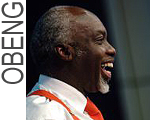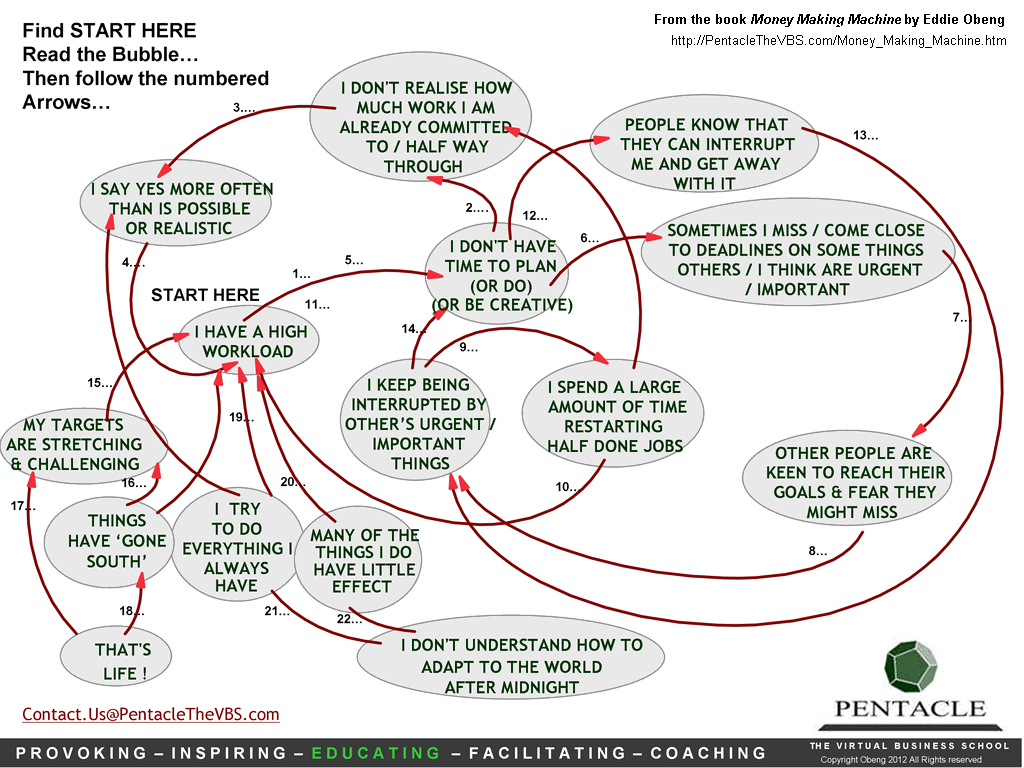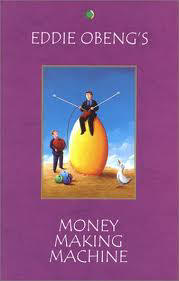Eddie
Obeng's
Money Making Machine
Two books for
the price of one!
Enjoyable Theory in a Novel -
Application
in a Practical Workbook.

Human Resources Magazine An agent provocateur
Financial Times
'Making it happen' is Obeng’s constant refrain and his books are an antidote to the dryness of much managerial
theorising. They come complete with their lessons in fictional form and implementation techniques such as rat-holing, blowing bubbles and the sticky steps approach to planning. Old world they are not.Financial Times
The revolution is here. One
of the emerging revolutionaries is Eddie Obeng founder of Pentacle The Virtual Business
School
Business Life
Contents
About the Author
Why?
A ‘true’ story
about discovering
the Money Making Machine.
Chapter 1 The Meeting
Chapter 2 Doing Lunch
Chapter 3 The Shop
Chapter 4 The Short Good-bye
Chapter 5 The Fifth Question
Chapter 6 The ArgentMeterTM
Chapter 7 The Re-visit
____________________________
In which the problems of trying to deliver results in the World After Midnight (WAM) are discussed and understood.
It’s gone. ‘Message for delivery to 2/ persons.’ In a single swift movement I’ve picked up my coat and keys and slipped on my jacket, grabbed the handle of my brown leather case, slipped my smartphone into my jacket pocket and pressed ‘start-u-s-return’ in rapid succession and I’m out of here.
What has prompted my bat-out-of-hell exit is that again as usual I’m late. ...And I’ve got so much to do. It seems to be the norm these days. The meeting over ran - largely because the guy on the audio link began a 30 minute monologue which no one could break into. We were supposed to be solving the business challenges and discussing how best to meet the lowered targets. Instead all we got was a 30 minute diatribe from an over enthusiastic VP. And as a result I didn’t manage to get the revised quarterly figures off and have spent the past half hour replying to e-mails and phone messages, chasing for the numbers. If only I’d got it off in time I could have saved all the effort of reassurance. Everyone is worrying about how the job cuts will affect them. And there is so much to do, ...and I can’t remember where I put the PowerPoint slides of last week’s resource meeting, ...and with the layoff announcements I need to resubmit my estimates. The last four minutes in the office were a desperate but unsuccessful scramble to try to find the e-mail they were attached to... I brake sharply avoiding the driver of a green Range Rover who has swerved unexpectedly. I zoom past him cursing slightly under my breath and noticing in an instant that he’s talking on his mobile. I guess I’m not the only one trying to get more done than I have time for. I’ll have to get them to send the PowerPoint e-mail again. I reach for my own ‘hands free’ phone. Just before I touch the green dial button it rings. I spend 15 minutes on a call which is of no real value to me and simply reminds me that there is so much more I have to do.
Now I’m pulling up on a high street of buildings that look untouched by time. Outside my car it’s still somewhere circa 1500. The road between the rows of buildings is wide, too wide, about five lanes wide but the road itself only takes up two lanes outside the buildings. Between the trees parking is perpendicular, and free. I still can’t spot the "It’s really easy to find. It’s a large cream building with a large black coach door. You can’t possibly miss it!" that I’m looking for. I find a parking spot and continue my search in haste on foot.
‘So why do you think you have this huge workload?’ he asks gently.
I’m sitting in a wooden beamed room at a round table looking out over the high street I was so recently driving along. I’ve missed my slot of the first coffee break and now my colleagues will be tied up with a computer simulation on their course for the next hour. So I have half an hour to kill before I can do my bit on the course providing the business context and strategic update and answering any pressing questions. I have half an hour to kill which I am passing by chatting away to one of the business educators at the business school. I reply, ‘The real problem is that I find that I keep agreeing to do things or be accountable for things.’
‘So you say Yes out of the goodness of your heart?’
‘Not really, it’s just that sometimes I don’t really know what is involved. And if I’m... to be honest, sometimes I forget exactly what I have on my plate and am already supposed to be doing. You see, the problem is that they all seem to need doing.’ I say, slightly embarrassed at my obvious lack of organisation. I think ‘I really sound pathetic.’ So I add, ‘So I end up saying Yes when I should probably be saying No or prioritising.’
‘So why do you think you have this huge workload?’ he asks gently.
‘You end up saying Yes when you should be saying No?’ he asks curiously with a slight inflection to the end of his sentence, emphasising the word No. He pauses briefly, ‘Why do you do that?' This time his tone is slightly accusing.
I think for a moment and say, ‘I guess because, if I’m being really honest, it’s because I don’t really have a complete idea of all the things I’ve promised and am supposed to be committed to." My voice trails off embarrassedly.
But Franck is now un-relentless in his interrogation. "What?’ he says with incredulity, ‘How come you don’t have a full idea of what you are already committed to and having to work on?’
‘Well, you see,’ I say pausing and trying to sound less pathetic than the contents of my words, ‘I don’t really have time to plan. There’s so much going on - and it keeps changing - I have to keep reacting to meetings, e-mails, audio conferences.’ I summarise, ‘I guess, to be honest, I’m really too busy to plan and anyway,’ I say to justify my conclusion, ‘As soon as I’ve made a plan it gets interrupted by something else and it becomes obsolete. So I just focus on the most critical issue.’
Franck nods understandingly but unsympathetically. He has a slight smile on his face. He asks gingerly, ‘Do you find that you often come close to the mark - almost missing deadlines on some of the jobs you have to do?’
‘Yes.’ I reply, nodding in agreement. Having to respond to executives chasing for information was after all one of the main reasons I was late for our meeting.
‘And,' he continues, ‘do you find that other people, sensing that you might come very close to their deadlines or even just miss them, do their best to chase progress, often interrupting you?’
I nod energetically. How does he know this? Franck must have been sitting on my shoulder all day to know all this. I say with feeling ‘It’s really annoying, but I have to rush to finish off jobs which come close to the deadlines whilst fending off phone calls and e-mails which need replying to, but simply slow you down rather than letting you just get on with the work. I’ve tried not replying, but staying silent simply prompts even more interruptions and it means that when you do deliver everyone is really fed up with you.’
‘Do you also find,’ he asks, pausing as if for effect, 'that you spend a lot of your time trying to find notes of previous meetings, getting your self back up-to-speed and in general restarting half done jobs?'
I nod vigorously. ‘Yes.’ I say, ‘and what’s so annoying about having so many jobs on the go is that, having to manage all the paper on your desk and a full in-tray of e-mails, just makes it harder to stay on top.’
Now Franck is smiling as if he has a secret joke. His expression makes me feel slightly threatened. He says, ‘With all that paper on your desk and with you constantly asking your colleagues to re-send e-mails you send out clear signals, so now people know that you are not in control.’ I think, "This is amazing - how does this guy know what’s going on in my world without being there?" He’s still talking. ‘Guess what? They constantly phone you on your mobile and e-mail you continuously trying to get to the head of the queue. This effectively messes up any planning you’ve done and adds to your enormous and ever-growing workload!’ He guffaws as if this is the punch-line of the joke he has been building up to throughout our conversation.
He’s right. But how did he know? And now what do I do to get myself out of the mess? I think all these thoughts but instead I say, ‘It’s not funny you know.’
"The best way to understand a complex interactive problem is one bubble at a time."
‘But it is,’ he replies. ‘Look, here’s a diagram I drew up before I met you.’ He pulls out a laminated A4 sheet of grey circles and red arrows in a swirl on a white background. It looks complicated. I recoil automatically. He notices and says, ‘It’s not as complicated as it looks, it’s worse!’ and then he smiles a warm friendly smile. ‘No, honestly, it’s not so complicated, if you take it in one bubble at a time.
Click to enlarge the BubbleDiagram>>

Click to enlarge the BubbleDiagram>>
That’s the best way to understand a complex interactive problem is one bubble at a time.’ He talks me around it, pointing to one yellow bubble and then following the red arrow round to the next. He starts with the bubble which says ‘I have a huge workload.’ As he follows the red arrow along from tail to tip with his finger he says, ‘which means that,’ and then he reads the next yellow bubble ‘I don’t really have the time to plan.’ He pauses briefly and then follows the next red arrow, ‘and as a result,’ now the yellow bubble, ‘I don’t realise how much work I’m already committed to/half way through.’ He carries on in this way covering the whole diagram.
‘Yes, it’s good to focus as you told me you do, but you must not become fixated. Focus but focus frequently.’
I’m stunned. It’s there. It’s my life, there on his diagram. I ask, ‘How did you...?’
He interrupts, ‘That’s not important. What is important is that you aren’t the only one who’s stuck in this triple nested set of vicious cycles. And what is even more important is finding a way to get you out of them.’ He points to a pair of bubbles he hadn’t previously read out one saying ‘I don’t understand the New Rules for the New World’ and the other saying ‘I don’t understand how the M.M.M. works.’
I’m slow. My brain is in a jumble. I stare at the diagram. ‘What? How? What? Does he?...’. Words start to crystallise, form from the cacophony. ‘What New Rules... and what’s an M.M.M?’ I ask, raising my head to look directly at Franck, but get no reply. The door bursts open and sixteen of my colleagues noisily pour into the room, thirsty for coffee and to hear from me about the latest strategic moves.
